Related Research Articles

Avram Hershko is a Hungarian-Israeli biochemist who received the Nobel Prize in Chemistry in 2004.
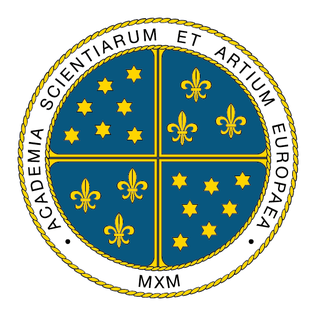
The European Academy of Sciences and Arts is a transnational and interdisciplinary network, connecting about 2,000 recommended scientists and artists worldwide, including 37 Nobel Prize laureates. The European Academy of Sciences and Arts is a learned society of scientists and artists, founded by Felix Unger. The academy was founded 1990, is situated in Salzburg and has been supported by the city of Vienna, the government of Austria, and the European Commission. The EASA is now headed by President Klaus Mainzer, TUM Emeritus of Excellence at the Technical University of Munich and Senior Professor at the Carl Friedrich von Weizsäcker Center of the University of Tübingen.

The Academia Europaea is a pan-European Academy of Humanities, Letters, Law, and Sciences. The Academia was founded in 1988 as a functioning Europe-wide Academy that encompasses all fields of scholarly inquiry. It acts as co-ordinator of European interests in national research agencies.

Pascale Cossart is a French bacteriologist who is affiliated with the Pasteur Institute of Paris. She is the foremost authority on Listeria monocytogenes, a deadly and common food-borne pathogen responsible for encephalitis, meningitis, bacteremia, gastroenteritis, and other diseases.
Kevin Mulligan is a British philosopher, working on ontology, the philosophy of mind, and Austrian philosophy. He is currently Honorary Professor at the University of Geneva, Full Professor at the University of Italian Switzerland, Director of Research at the Institute of Philosophy of Lugano, and member of the Academia Europaea and of the Royal Swedish Academy of Letters. He is also known for his work with Peter Simons and Barry Smith on metaphysics and the history of Austrian philosophy.
Katalin É. Kiss is a Hungarian linguist. She is currently professor at the Research Institute for Linguistics of the Hungarian Academy of Sciences, in Budapest.
The Massry Prize was established in 1996, and until 2009 was administered by the Meira and Shaul G. Massry Foundation. The Prize, of $40,000 and the Massry Lectureship, is bestowed upon scientists who have made substantial recent contributions in the biomedical sciences. Shaul G. Massry, M.D., who established the Massry Foundation, is Professor Emeritus of Medicine and Physiology and Biophysics at the Keck School of Medicine, University of Southern California. He served as Chief of its Division of Nephrology from 1974 to 2000. In 2009 the KECK School of Medicine was asked to administer the Prize, and has done so since that time. Ten winners of the Massry Prize have gone on to be awarded a Nobel Prize.
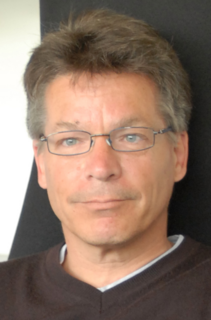
Wolf Reik FRS is a German molecular biologist and a group leader at the Babraham Institute, honorary professor of Epigenetics at the University of Cambridge and associate faculty at the Wellcome Trust Sanger Institute. He was announced as the director of Altos Labs Cambridge Institute when the company launched on 19 January 2022.
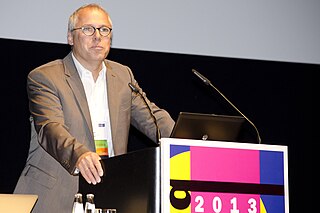
Martin Vingron is an Austrian mathematician working in the fields of bioinformatics and computational biology. Since 2000, he has been Director of the Max Planck Institute for Molecular Genetics.

Dimitri Michael Kullmann is a professor of neurology at the UCL Institute of Neurology, University College London (UCL), and leads the synaptopathies initiative funded by the Wellcome Trust. Kullmann is a member of the Queen Square Institute of Neurology Department of Clinical and Experimental Epilepsy and a consultant neurologist at the National Hospital for Neurology and Neurosurgery.
Lelio Orci was an Italian scientist in the field of endocrinology and diabetes and emeritus professor in the Department of Morphology at the University of Geneva Medical School.
Herwig Maehler, FBA was a German historian and papyrologist, who specialized in classics and ancient history.
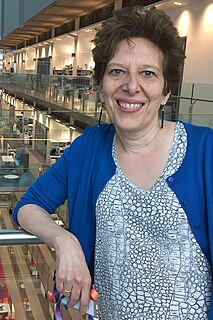
Caroline Susan Hill is a group leader and head of the Developmental Signalling Laboratory at the Francis Crick Institute.
Elisa Izaurralde was an Uruguayan biochemist and molecular biologist. She served as Director and Scientific Member of the Department of Biochemistry at the Max Planck Institute for Developmental Biology in Tübingen from 2005 until her death in 2018. In 2008, she was awarded the Gottfried Wilhelm Leibniz Prize, shared with Elena Conti, for "fundamental new insights into intracellular RNA transport and RNA metabolism". Together with Conti, she helped characterize proteins important for exporting mRNA out of the nucleus and later in her career she helped elucidate mechanisms of mRNA silencing, translational repression, and mRNA decay.
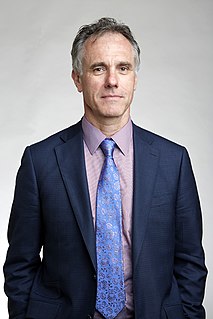
Richard Malcolm Marais is Director of the Cancer Research UK (CRUK) Manchester Institute and Professor of Molecular Oncology at the University of Manchester.

Marileen Dogterom is a Dutch biophysicist and professor at the Kavli Institute of Nanoscience at Delft University of Technology. She published in Science, Cell, and Nature and is notable for her research of the cell cytoskeleton. For this research, she was awarded the 2018 Spinoza Prize.
Barbara Elisabeth Borg is Professor of Classical Archaeology at the University of Exeter. She is known in particular for her work on Roman tombs, the language of classical art, and geoarchaeology.
Greet Van den Berghe is an intensive care specialist and since 2002 head of the Department of Intensive Care of the University Hospital of Leuven and head of the Laboratory of Intensive Care Medicine at the Faculty of Medicine, KU Leuven.
Irene J. F. de Jong is a classicist and professor of Ancient Greek at the University of Amsterdam. She is known for her pioneering work on narratology and Ancient Greek literature. She is a Fellow of the British Academy.

Annalisa Pastore is a Professor of Chemistry and Molecular Biology at King's College London. In 2018 she was appointed full professor at the Scuola Normale Superiore di Pisa. In 2022, she was appointed director of research for life sciences, chemistry and soft matter science at European Synchrotron Radiation Facility.
References
- ↑ Hoffmann, Ilire Hasani, Robert. "Academy of Europe: What are we". www.ae-info.org.
- ↑ Hoffmann, Ilire Hasani, Robert. "Academy of Europe: Nomination and Election Process". www.ae-info.org.
- ↑ Hoffmann, Ilire Hasani, Robert. "Academy of Europe: Becoming a member". www.ae-info.org.
- ↑ "Membership Election Procedure" (PDF). www.ae-info.org.
- ↑ Hoffmann, Ilire Hasani, Robert. "Academy of Europe: List Members By Alphabet". www.ae-info.org.
- ↑ Sinclair, Craig (1990). "Introduction to the Academia Europaea". Science and Public Policy. doi:10.1093/spp/17.2.67. ISSN 1471-5430.
- ↑ Burgen, Arnold (2009). "Academia Europaea: Origin and Early Days". European Review. 17 (3–4): 469. doi:10.1017/S106279870900088X. ISSN 1062-7987. S2CID 145564036.
- ↑ Seibold, Eugen (2011). "First Steps towards the Academia Europaea". European Review. 19 (2): 183–187. doi:10.1017/S1062798710000487. ISSN 1062-7987. S2CID 145798539.
- ↑ Buttimer, Anne (2011). "Focus: Academia Europaea: Founders and Founding Visions". European Review. 19 (2): 153–160. doi:10.1017/S1062798710000451. ISSN 1062-7987. S2CID 145544534.
- ↑ Magnusson, David (2011). "Academia Europaea: Founding Visions. Professor David Magnusson Interviewed by Anne Buttimer". European Review. 19 (2): 223–232. doi:10.1017/S1062798710000517. ISSN 1062-7987. S2CID 145628033.
- ↑ Dickson, D. (1987). "Toward an Academia Europaea?". Science. 237 (4819): 1102. doi:10.1126/science.237.4819.1102. ISSN 0036-8075. PMID 17801623.
- ↑ "Nobel_Prize" . Retrieved 24 September 2014.
- ↑ "Wolf Prize" . Retrieved 24 September 2014.
- ↑ "Turing Award" . Retrieved 24 September 2014.
- ↑ "Fields Medal" . Retrieved 24 September 2014.
- ↑ "Lasker Award" . Retrieved 24 September 2014.
- ↑ "Abel Prize" . Retrieved 24 September 2014.
- ↑ "Goedel Prize" . Retrieved 24 September 2014.
- ↑ "Honorary Members" . Retrieved 24 September 2014.